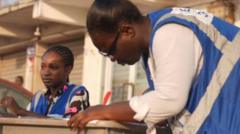In a significant democratic milestone, Ghana has begun counting votes following a general election that promised to bring fresh leadership to the nation. The election process on Saturday was described as peaceful, although reports surfaced of a fatal shooting in the northern town of Nyankpala. Local authorities detained four individuals connected to the incident, which emerged during the filing of a complaint by an opposition candidate against ruling party supporters.
To maintain order, the military has been deployed to Nyankpala, reinforcing security efforts in the area. Despite the unfortunate event, many citizens flocked to polling stations, eager to exercise their democratic rights, with some Ghanaians queuing up before dawn to ensure their participation.
Official polling closed at 17:00 GMT, and election results are anticipated on Tuesday. In a somewhat unusual move, Ghana's land borders were closed until Sunday evening, a decision that has raised eyebrows.
This election guarantees a new president as incumbent Nana Akufo-Addo steps down after completing two terms. The frontrunner is former President John Mahama, attempting a comeback, with Vice-President Mahamudu Bawumia as his main rival. If successful, Bawumia would make history as Ghana's first Muslim president. Other candidates include businessman Nana Kwame Bediako and Alan Kyerematen, who departed from the ruling party last year.
Around 19 million Ghanaians were registered to vote in the election. Yet despite recent initiatives aimed at increasing female representation in politics, only one female candidate, Nana Akosua Sarpong Frimpomaa of the Convention People's Party, is in contention for the presidency. The late Akua Donkor was another female candidate but died in October; her name remains on the ballot due to disqualification of her successor.
Voters across 275 constituencies also selected members for parliament during the general election. Historically, since the introduction of multi-party politics in Ghana in 1992, only candidates from the National Democratic Congress (NDC) or the governing New Patriotic Party (NPP) have secured the presidency. Furthermore, no party has ever achieved more than two consecutive terms in power.
To win outright, a presidential candidate must secure more than 50% of the votes; otherwise, the leading two candidates will proceed to a run-off scheduled for the end of December. Young voters play a crucial role in this electoral process, with issues such as job creation and educational opportunities being paramount concerns.
A first-time voter, 18-year-old Serwaa Yeboah Joshebeth, emphasized the importance of voting to select the best leaders for the community. Others echoed similar sentiments. The prevailing economic challenges, particularly rising inflation and unemployment rates—the latter especially impactful on youth—are central to voter concerns.
As campaigns concluded, candidates exchanged stark contrasts in their messaging. Bawumia asserted the ruling government's achievements amid adversity, while Mahama committed to delivering a Ghana defined by opportunity and justice. These dynamics set the stage for what could be a transformative chapter in Ghana's political landscape.
To maintain order, the military has been deployed to Nyankpala, reinforcing security efforts in the area. Despite the unfortunate event, many citizens flocked to polling stations, eager to exercise their democratic rights, with some Ghanaians queuing up before dawn to ensure their participation.
Official polling closed at 17:00 GMT, and election results are anticipated on Tuesday. In a somewhat unusual move, Ghana's land borders were closed until Sunday evening, a decision that has raised eyebrows.
This election guarantees a new president as incumbent Nana Akufo-Addo steps down after completing two terms. The frontrunner is former President John Mahama, attempting a comeback, with Vice-President Mahamudu Bawumia as his main rival. If successful, Bawumia would make history as Ghana's first Muslim president. Other candidates include businessman Nana Kwame Bediako and Alan Kyerematen, who departed from the ruling party last year.
Around 19 million Ghanaians were registered to vote in the election. Yet despite recent initiatives aimed at increasing female representation in politics, only one female candidate, Nana Akosua Sarpong Frimpomaa of the Convention People's Party, is in contention for the presidency. The late Akua Donkor was another female candidate but died in October; her name remains on the ballot due to disqualification of her successor.
Voters across 275 constituencies also selected members for parliament during the general election. Historically, since the introduction of multi-party politics in Ghana in 1992, only candidates from the National Democratic Congress (NDC) or the governing New Patriotic Party (NPP) have secured the presidency. Furthermore, no party has ever achieved more than two consecutive terms in power.
To win outright, a presidential candidate must secure more than 50% of the votes; otherwise, the leading two candidates will proceed to a run-off scheduled for the end of December. Young voters play a crucial role in this electoral process, with issues such as job creation and educational opportunities being paramount concerns.
A first-time voter, 18-year-old Serwaa Yeboah Joshebeth, emphasized the importance of voting to select the best leaders for the community. Others echoed similar sentiments. The prevailing economic challenges, particularly rising inflation and unemployment rates—the latter especially impactful on youth—are central to voter concerns.
As campaigns concluded, candidates exchanged stark contrasts in their messaging. Bawumia asserted the ruling government's achievements amid adversity, while Mahama committed to delivering a Ghana defined by opportunity and justice. These dynamics set the stage for what could be a transformative chapter in Ghana's political landscape.



















